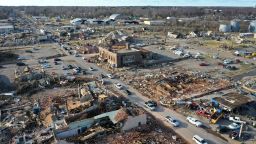Powerful storms like the ones that tore through parts of the central United States this weekend are the “new normal” in an era of climate change, the top federal emergency management official said on Sunday.
Deanne Criswell, the FEMA administrator, said her agency was prepared to bolster resilience in the face of more severe weather.
“This is going to be our new normal,” Criswell told CNN’s Jake Tapper on “State of the Union.”
“The effects we are seeing of climate change are the crisis of our generation,” Criswell said. “We’re taking a lot of efforts at FEMA to work with communities to help reduce the impacts that we’re seeing from these severe weather events and help to develop systemwide projects that can help protect communities.”
She said the severity, duration and magnitude of the storms this late in the year were “unprecedented.”
A day earlier, President Joe Biden said it was too early to know the specific effect climate change had on this week’s storms. He said he would ask his Environmental Protection Agency to assess.
Scientific research on the role that climate change is playing in the formation and intensity of tornadoes is not as robust as for other types of extreme weather like droughts, floods and even hurricanes. The short and small scale of tornadoes, along with an extremely spotty and unreliable historical record for them, makes assessing their relationships to long-term, human-caused climate change very difficult.
While establishing connections between climate change and tornadoes is difficult, the correlation between El Niño/La Niña and tornadoes is strong. La Niña seasons tend to have increased tornado activity in the US, and it is worth noting that the US is currently experiencing La Niña, which is expected to last into spring of next year.
A rescue mission
Criswell was speaking ahead of a scheduled visit to Kentucky to assess damage from a string of powerful storms that swept across a wide swath of the Midwest and South. She will travel alongside Alejandro Mayorkas, the secretary of the Department of Homeland Security.
Criswell said the operation on the ground remains a rescue mission.
“I think there is still hope, right? We sent one of our federal urban search and rescue teams down to Kentucky. They arrived yesterday. They’ll be able to assist the localities with their ongoing rescue efforts. I think there is still hope and we should continue to try to find as many people as we can,” she said.
She listed housing – both short-term and long-term shelter – as a priority for the agency.
CNN’s Brandon Miller contributed to this report.





